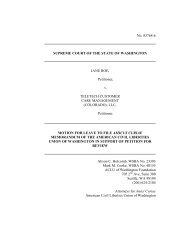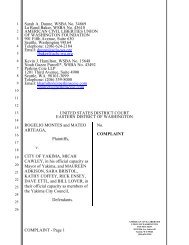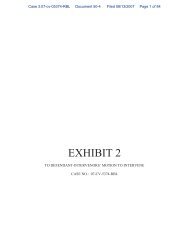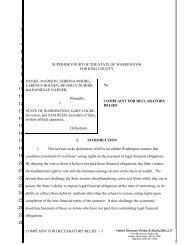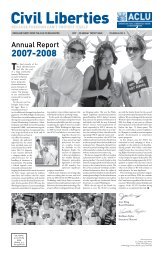BERGER v. CITY OF SEATTLE - ACLU of Washington
BERGER v. CITY OF SEATTLE - ACLU of Washington
BERGER v. CITY OF SEATTLE - ACLU of Washington
Create successful ePaper yourself
Turn your PDF publications into a flip-book with our unique Google optimized e-Paper software.
<strong>BERGER</strong> v. <strong>CITY</strong> <strong>OF</strong> <strong>SEATTLE</strong><br />
facial challenge to a state law, a federal court must . . . consider<br />
any limiting construction that a state court or enforcement<br />
agency has pr<strong>of</strong>fered.’ ” Ward, 491 U.S. at 795-96.<br />
[9] In Thomas, the Court recognized that the text <strong>of</strong> the rule<br />
might be interpreted to give undue discretion to deny a permit,<br />
but accepted the Park District’s assertion that permits<br />
would not be denied for “inadequacies that, under the circumstance,<br />
do no harm to the policies furthered by the application<br />
requirements.” 534 U.S. at 781; see also United States v.<br />
Buckland, 289 F.3d 558, 564 (9th Cir. 2002) (en banc) (“The<br />
Supreme Court instructs us that ‘every reasonable construction<br />
must be resorted to, in order to save a statute from unconstitutionality.’<br />
” (quoting Hooper v. California, 155 U.S. 648,<br />
657 (1895)). We read the rule to apply only to conduct aimed<br />
at attracting an audience—the sort <strong>of</strong> conduct that the city<br />
cites as the source <strong>of</strong> its concerns. In light <strong>of</strong> those interests,<br />
and the limited scope <strong>of</strong> the restriction, we are satisfied that<br />
Rule F.1 is narrowly tailored to significant governmental<br />
interests and avoids the constitutional infirmities discerned in<br />
Portland’s overbroad licensing scheme in Grossman.<br />
3<br />
227<br />
[10] Finally, we consider Berger’s argument that “[t]he permit<br />
requirement does not provide ample alternative channels<br />
for communication <strong>of</strong> a performer[’]s message because no<br />
performances are permitted anywhere at the Seattle Center<br />
without a permit.” Our precedent notes that “[i]n the ‘ample<br />
alternatives’ context, the Supreme Court has made clear that<br />
the First Amendment requires only that the government<br />
refrain from denying a ‘reasonable opportunity’ for communication.”<br />
Menotti, 409 F.3d at 1141. Under the Campus Rules,<br />
a performer may, without a permit, “convey his or her message<br />
verbally while walking through the campus,” and “like




